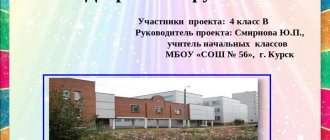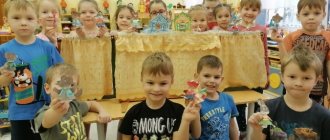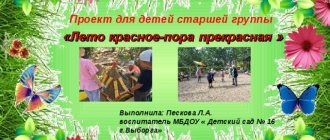The role of socially significant projects in the development of preschool education
Development of preschool education in the city of Novocherkassk
Ch. Education Department specialist
Administration of the city of Novocherkassk
Muravyova O.Yu.
The main source of financing for preschool education is and will remain in the near and distant future precisely the budget funds of municipalities. and also (to a relatively small extent) parental fees.
In connection with this topicality today, it seems to us that solving the problems of preschool education is possible using a program-targeted method, that is, through the adoption of targeted programs aimed at the development of preschool education, which make it possible to ensure the allocation of subsidies and subventions from the budgets of the constituent entities of the Russian Federation and municipal formations, as well as the possibility of attracting extrabudgetary funds.
City long-term target program
“Development of new forms of preschool education and expansion of the network of municipal preschool educational institutions in the city of Novocherkassk for 2011-2014” is aimed at providing accessible and high-quality preschool education in the city.
The main objectives of the Program are:
development of new forms of preschool education;
increasing the number of places in preschool educational institutions by optimizing the existing network;
construction of new and reconstruction of existing preschool educational institutions;
More than 10,000 children aged 0 to 6 years live in the city of Novocherkassk. More than 6,000 children attend our kindergartens. There are 3,600 people from 0 to 6 years old registered with the Department of Education for a place in the city’s kindergartens, of which 2,100 are the most needy, from 2 to 6 years old.
In one year of the program, we increased the number of places provided in kindergartens by 580 units due to the renovated premises of previously mothballed pre-school groups, the opening of short-stay groups, family groups as structural divisions of kindergartens.
In order to realize the rights of children who do not attend kindergartens in the city to equal opportunities in receiving preschool education, the Resolutions of the City Administration “On the opening of short-term groups in municipal preschool educational institutions” and “On the development of variable forms of preschool education in the city of Novocherkassk” were adopted, regulating the creation various variable conditions for obtaining preschool education.
The variable education system is represented by the following forms:
— short-term groups in 22 preschool institutions in the amount of 37 units for more than 500 places;
Groups are open at the request of parents with different areas of activity:
— for children with special educational needs;
— preschool education (today, satisfaction in preschool education for children of senior preschool age from 5 to 7 years old in our city is 96%);
- walking and weekend groups,
— adaptation groups for children and parents from 1.5 to 3 years old,
— supervision and care groups
It should be noted that no matter how many different services we provide, parents require one thing - a full day of stay and three meals a day.
There are few working mothers who are satisfied with a short day in kindergarten.
Also in our city they are ready to open
— 3 family preschool groups for 14 places
, created in the form of structural divisions of municipal budgetary preschool educational institutions of the Khotunok microdistrict, the central part of the city. This is a new form of preschool education that we encountered in 2011. Such groups are opened for children from large families and for children who did not receive a place in kindergarten.
What problems related to opening family groups concern us today?
Negative points and risks
— the organization of the work of family kindergartens, even if they are widespread, does not provide a significant increase in the enrollment of children in preschool education due to the impossibility of finding a large number of children in a residential building or apartment;
— the optional pedagogical education of the mother-educator, on the one hand, and the need to implement a general education program for preschool education, on the other hand, create a number of difficulties associated, first of all, with the organization and conduct of classes (speech development, mathematical development, etc.). This issue is resolved through a system of mentoring and the widespread involvement of specialist teachers from preschool educational institutions. At the same time, it is obvious that without course retraining (training) of a teacher who does not have a pedagogical education, the organization of qualified activities of a mother-educator in a family kindergarten is impossible;
— living conditions offered by families do not correspond to modern SanPin;
- complex and expensive procedure for undergoing medical examinations;
— payment to the kindergarten for visiting by your own child, etc.;
The expected end results of the program are a reduction in the waiting list for preschool institutions in the city by 1015 places, including through the construction and reconstruction of buildings for children's institutions.
Today we consider the conversation about public-private partnership in the field of education
exactly in this direction.
In our opinion, first of all, these are investments in the construction and reconstruction of previously mothballed or leased kindergarten buildings.
The form of effective cooperation in this direction can be called:
— a concession agreement under which educational facilities can be transferred for the construction of new or modernization of existing property (Article 4 of the Federal Law of July 6, 2005 No. 115-FZ “On Concession Agreements”;
- use of the BOLT system or “leaseback”, when on a competitive basis the investor builds an object on a municipality’s land plot at the expense of his own or borrowed funds and leases it to a person engaged in education;
Dear investors, the “Program for the Development of Preschool Education in the City of Novocherkassk” is waiting for you.
State leaders have repeatedly touched upon the development of the non-state sector in education in their speeches.
Russian President Dmitry Medvedev signed the Federal Law “On Amendments to the Law of the Russian Federation “On Education” and Article 263 of the Federal Law “On the General Principles of Organization of Legislative (Representative) and Executive Bodies of State Power of the Subjects of the Russian Federation.”
Today, the Federal Law establishes the responsibilities of the state to assist citizens in obtaining preschool education in non-state preschool educational institutions,
by ensuring the education of citizens in these educational institutions at the expense of the corresponding budgets of the budgetary
system of the Russian Federation.
Organizations of non-state preschool institutions
- this is the creation of a private kindergarten, similar to a municipal or state one, in a separate building with an adjacent territory, containing several groups of children of different ages and organizing educational activities.
In our city, such a “private kindergarten” is ready to open. However, they cannot conduct educational activities there.
In fact, this is an individual entrepreneur who rented premises from a relative, completed the building of a residential building, invested considerable funds and went quite a long way to opening his own business. Having received the OKVED code, he registered as an individual entrepreneur. Due to the lengthy process of registering property relations, it is impossible to obtain a license to conduct educational activities. Therefore, today our “private kindergarten” functions as an individual entrepreneur - a center for organizing leisure, supervision, care, etc.
What difficulties did you encounter when opening this institution?
— refusal to provide a loan due to the fact that, based on the declaration, the entrepreneur does not show profit;
— high loan rate, without taking into account the specifics of further activities;
— high rent of premises;
— large financial investments to create conditions in accordance with modern requirements of Rospotrebnadzor and Gospozhnadzor;
— lack of a license for educational activities;
And the consequence of this is the impossibility of obtaining a municipal assignment.
Today there is a legal basis for the provision of municipal orders by non-state educational institutions, but how can we help individual entrepreneurs?
Among the problems that a non-state kindergarten, as well as an individual entrepreneur, have to face is the inability to participate in government programs to support small and medium-sized businesses. These programs are designed primarily for commercial organizations, and educational activities have non-profit status.
There are also problems in obtaining long-term loans for development, repairs and construction.
Banks do not consider social facilities as attractive collateral, and they have little interest in “long-term business”, which is private education.
The state, as an interested partner, could act as a guarantor in these relationships and work out a mechanism for private kindergartens to receive long-term bank loans.
In order to improve the legislative and regulatory framework for the further development of the non-state sector in preschool education, we propose:
1) initiate in the legislative bodies the adoption of regulations establishing the abolition of taxes on profits, property, and land for non-state preschool institutions;
2) include non-state preschool institutions in the list of institutions that receive preferential tariffs for utility services;
3) establish tax incentive measures for organizations providing financial assistance to non-state preschool educational institutions;
4) pay federal compensation for part of parental fees to parents of non-state preschool institutions for maintaining a child in kindergarten;
6) provide free assistance to private entrepreneurs in organizing new kindergartens by leasing free of charge buildings (areas) on which the new kindergarten will be organized, and sharing the budget in covering the costs of repair, restoration and construction work.
Taking into account the above, we believe that the creation
favorable economic conditions will ensure the profitability of investments in the broad sense of the term (that is, in the form of the provision of financial resources, equipment, intellectual, human and other resources) in the field of preschool education by organizations and citizens;
What other forms of cooperation do we see between government and business:
- Formation of trustee or management boards. This mechanism becomes especially relevant if philanthropists and social investors put forward, as a condition for a preschool educational institution to receive long-term financing, the opportunity to participate in the formation of development programs and monitoring their implementation.
- Grant support for teachers of preschool educational institutions.
MAGAZINE Preschooler.RF
Social and educational environmental project “Children are happy on a clean planet!”Author: Skripchenko Natalya Viktorovna, senior teacher of the MBDOU “Kindergarten of the village of Alatorka”
The motto of the project is “Our home is the Earth, the green planet - Our duty, friends, is to save all this! ”
METHODOLOGICAL DATA SHEET OF THE PROJECT:
Topic: socio-educational environmental project “Children are happy on a clean planet!” for implementation in groups of senior preschool age.
Relevance of the problem
The relevance of the chosen topic is undeniable: environmental literacy today is a necessary condition for preserving the environment and human life itself. Without a serious study of the state of the environment, without organizing systematic work to protect the beautiful corners of nature in our village and on the Earth as a whole, it is impossible to imagine the further existence of humanity.
The ecological and social situation of today confronts preschool education specialists with the task of finding universal means of environmental education in modern conditions.
An environmental project is a universal tool for environmental education of preschoolers. Preschool age is an important stage in the development of an individual’s ecological culture. At this age, the child begins to distinguish himself from the environment, an emotional and value-based attitude towards the environment develops, and the foundations of the moral and environmental positions of the individual are formed.
Problem: low level of ecological culture of preschool children; lack of respect for the environment of your village, region, country.
The goal of the project: to develop children's knowledge about various types of activities to protect nature.
Project objectives:
- Expand children’s knowledge about the interdependence of the natural world and human activities, both economic and environmental;
- To form ideas about the feasibility of recycling household and household waste;
- Stimulate interest in research activities, improve the ability to operate with existing knowledge, generalize, and draw conclusions;
- To develop the ability to correctly express one’s attitude towards the actions of children and adults from the perspective of generally accepted norms and to adequately perceive the assessment of one’s behavior;
- Develop imagination, the ability to realize one’s impressions in artistic and creative activities.
Project participants: pupils of senior and preparatory groups, their parents, teachers.
Project type: informational - research, socially significant
By duration of implementation: long-term (September - June).
Project implementation forms:
- Joint activities of students and adults (teachers, parents).
- Research and design activities.
- Participation in various promotions and environmental competitions.
- Productive activity.
Terms of sale:
- Involvement of children and adults in the implementation of project activities.
- Personal interest of all project participants in solving the problem.
- A creative approach to project implementation in order to optimize the interaction of all participants.
Project effectiveness criteria:
- Relevance of the problem.
- Feasibility and viability of the project.
- Feasibility of tasks for project participants.
- The level of activity of project participants in its implementation.
- The breadth of the project’s coverage of students, teachers, and parents.
Methods for studying performance:
- Photo and video materials about the progress of the project.
- Observation, questioning.
Expected results of the project:
For pupils: instilling environmental culture in children; responsible attitude towards socially significant tasks; development in children of initiative, activity, independence in acquiring new knowledge and impressions about the world around them.
For teachers: increasing professionalism; introduction of new methods in working with children and parents; personal and professional growth; self-realization.
For parents: increasing the level of personal consciousness; strengthening relationships between children and parents; self-realization.
Project stages:
- Preparatory
- Basic
- Analytical
Plan for phased implementation of the project
First stage
- Studying scientific and methodological literature on this issue.
- Diagnostics of the level of ecological culture of pupils.
Second phase
- Determining the stages and timing of the project;
- Development of thematic planning;
- Planning joint activities during organized educational activities and in special moments, taking into account the environmental focus.
Third stage
- Practical solution
- Repeated diagnostics of the level of ecological culture of pupils
- Project performance analysis. Conclusion.
Project content
Preparatory stage
- Studying literary sources, the experience of other educational institutions, drawing up a theoretical concept;
- Drawing up a long-term plan for work on the project “Children are happy on a clean planet!” ;
- Diagnostics of the level of ecological culture of pupils;
- Systematization and design of didactic materials, selection of children's literature in accordance with the project plan;
- Development of reminders and consultations for parents with an environmental focus;
- Preparing parents for joint work, surveying to identify environmental knowledge.
Practical stage
Long-term project implementation plan
“Children are happy on a clean planet!”
№
| Events | date | Performers | |
| 1. | Conversation “Life is good on our planet, but it’s not easy for the planet” Watching cartoons and videos on ecology. | September | Teachers, pupils |
| 2. | OOD "Garbage comes in different forms" Experimental activity “If you bury garbage in the ground, what will happen?” | September - May | Teachers, pupils |
| 3. | Walk - competition in a rural park “We will remove leaves, branches and restore order” | October | Teachers, pupils |
| 4. | Joint project with parents: Fair of ideas “The richness of nature helps creativity!” | October | Teachers, students, parents |
| 5. | Mini-projects “The Amazing World of Fabrics”, “Plastic in Our Life” “How the book was born” (in groups) | November | Teachers, pupils |
| 6. | Environmental campaign “We will collect waste paper and save the lives of trees!” Quiz “Such familiar strangers” (on knowledge of trees growing in our forests) | December | Teachers, students, parents |
| 7. | Poster competition “Sorting waste - saving nature” Memo for parents “Separately collected waste is not garbage” Purchasing multi-colored baskets for separate waste collection | January | Teachers, students, parents |
| 8. | Decoration of the corner “Touch nature with your heart” Participation in the regional children's creativity competition "Green Nimbus" | February | Teachers, pupils |
| 9. | Review - costume competition “Shirt made of paper, bows made of candy wrappers” | March | Teachers, parents, children |
| 10. | Reading competition Ecological fairy tale “The Story of a Small Spring” | April | Teachers, children |
| 11. | Environmental cleanup “Let’s put things in order together” Participation in the regional event “Green Village” (tree planting) | April May | Parents, teachers, children |
| 12. | Making crafts from waste materials to decorate the territory of a kindergarten | May | Teachers, children Parents |
| 13. | Walk-hike “Aspen, rowan, linden and oak, guys, are waiting for us to visit!” | June | Teachers, children Parents |
| 14. | Quest game “We hear the ringing voice of the spring from afar!” | June | Teachers, children |
| 15. | Release of the newspaper “Children are happy on a clean planet!” | Monthly | Educators |
Analytical stage:
- Practical solution
- Repeated diagnostics of the level of ecological culture of pupils
- Project performance analysis. Conclusion.
Prospects for the development of the project.
ücreation of an environmentally friendly environment on the territory of the preschool educational institution;
üimproving the level of professional skills of teachers on the topic of the project;
üparticipation of 100% of children and employees of the preschool educational institution in the work to create a clean ecological zone on the territory of the preschool educational institution and the adjacent territory;
üinvolving parents in landscaping and landscaping.
| < Previous | Next > |




